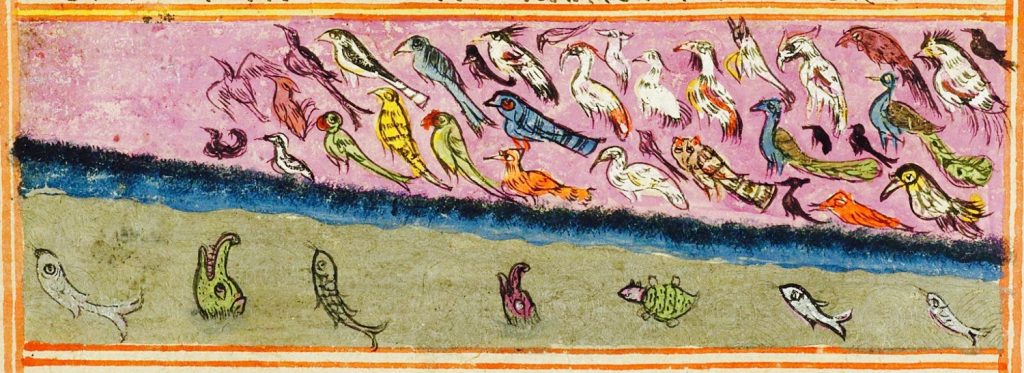Read the previous part here…
“There is no greater wealth than happiness”, explained Mantharaka.

What follows are some points of wisdom on satisfaction and happiness, and a lot of yogic thought as well. Since they are in verse form, one may tend to want to skip them. I would encourage you to read these as sayings, like reading a book by Rumi (since he is the flavour of the season) for instance. Each sloka can be read independently and meditated upon, before moving to the next.
The Panchatantra has a lot of engaging stories, but at the heart of it are these very sayings – brought to you wrapped in glitter paper to make them more attractive. We love a ‘light read’, and generally shy away from heavy topics don’t we? Well the Panchatantra brings you these same topics, engages you with the stories, and feeds you the medicine without you knowing it. This is what makes the Panchatantra timeless…
Lets read on!
सन्तोषामृत-तृप्तानां यत् सुखं शान्त-चेतसाम् ।
कुतस् तद्-धन-लुब्धानाम् इतश् चेतश् च धावताम् ॥ १५७ ॥
santoṣāmṛta-tṛptānāṃ yat sukhaṃ śānta-cetasām |
kutas tad-dhana-lubdhānām itaś cetaś ca dhāvatām || 157 ||
The peace and calm that contentment brings cannot be experienced by men who run around chasing money – they are never satisfied.
पीयूषम् इव संतोषं पिबतां निर्वृतिः परा ।
दुःखं निरन्तरं पुंसाम् असंतोषवतां पुनः ॥ १५८ ॥
pīyūṣam iva saṃtoṣaṃ pibatāṃ nirvṛtiḥ parā |
duḥkhaṃ nirantaraṃ puṃsām asaṃtoṣavatāṃ punaḥ || 158 ||
Those who are happy and content are forever in bliss. Those who are unhappy and unsatisfied are always in suffering.
निरोधाच् चेतसो ऽक्षाणि निरुद्धान्य् अखिलान्य् अपि ।
आच्छादिते रवौ मेघैः सञ्छन्नाः स्युर् गभस्तयः ॥ १५९ ॥
nirodhāc cetaso ‘kṣāṇi niruddhāny akhilāny api |
ācchādite ravau meghaiḥ sañchannāḥ syur gabhastayaḥ || 159 ||
Just as the piercing rays of the sun get covered by when the clouds cover the sun, so do the senses come under control when one controls the mind.
वाञ्छा-विच्छेदनं प्राहुः स्वास्थ्यं शान्ता मह-र्षयः ।
वाञ्छा निवर्तते नार्थैः पिपासेवाग्नि-सेवनैः ॥ १६० ॥ अनिन्द्यम् अपि निन्दन्ति स्तुवन्त्य् अस्तुत्यम् उच्चकैः ।
vāñchā-vicchedanaṃ prāhuḥ svāsthyaṃ śāntā maha-rṣayaḥ |
vāñchā nivartate nārthaiḥ pipāsevāgni-sevanaiḥ || 160 || anindyam api nindanti stuvanty astutyam uccakaiḥ |
Elimination of desire is the true essence of well-being – so say the sages. Just as thirst cannot be quenched by consuming fire, desires cannot be eliminated by hoarding more wealth.
“Instead, desires keep increasing – the more you tend to them, the more they increase.”
दानेन तुल्यो निधिर् अस्ति नान्यो लोभाच् च नान्यो ऽस्ति परः पृथिव्याम् ।
विभूषणं शील-समं न चान्यत् सन्तोष-तुल्यं धनम् अस्ति नान्यत् ॥ १६३ ॥
dānena tulyo nidhir asti nānyo lobhāc ca nānyo ‘sti paraḥ pṛthivyām |
vibhūṣaṇaṃ śīla-samaṃ na cānyat santoṣa-tulyaṃ dhanam asti nānyat || 163 ||
There is no greater treasure than charity. There is no greater enemy than greed. There is no greater accessory than character, and there is no greater wealth than happiness.
दारिद्र्यस्य परा मूर्तिर् यन् मान-द्रविणाल्पता ।
जरद्-गव-धनः शर्वस् तथापि परमेश्वरः ॥ १६४ ॥
dāridryasya parā mūrtir yan māna-draviṇālpatā |
jarad-gava-dhanaḥ śarvas tathāpi parameśvaraḥ || 164 ||
The other form of poverty is begging, not the lack of money. Shiva just has an old bull, yet he is considered the Lord of the world – because he does not ever beg for anything.
“सकृत् कन्दुकपातेन पतत्यार्यः पतन्नपितथा पतति मूर्खस्तु मृत्पिण्डपतनं यथा – even if a wise man faces hardship in life, he bounces back, like a ball. A foolish man however, falls like a lump of mud – never to rise again.”
“And so, my friend”, concluded Mantharaka. “Just learn to be happy!”
LaghuPatanaka, who had been hearing all this with a lot of interest, clapped and told Hiranyaka “My dear, you should follow Mantharaka’s advice. Whatever he has said, he has said for your own good. Don’t take anything to heart. It is said…”
सुलभाः पुरुषा राजन् सततं प्रिय-वादिनः ।
अप्रियस्य च पथ्यस्य वक्ता श्रोता च दुर्लभः ॥ १६६ ॥
sulabhāḥ puruṣā rājan satataṃ priya-vādinaḥ |
apriyasya ca pathyasya vaktā śrotā ca durlabhaḥ || 166 ||
It is easy to find people who speak sweetly all the time, but it is rare to find people who can speak words that are unpleasant, but for your welfare, and it is also rare to find people who can listen to such people.
अप्रियाण्य् अपि पथ्यानि ये वदन्ति नृणाम् इह ।
त एव सुहृदः प्रोक्ता अन्ये स्युर् नाम-धारकाः ॥ १६७ ॥
apriyāṇy api pathyāni ye vadanti nṛṇām iha |
ta eva suhṛdaḥ proktā anye syur nāma-dhārakāḥ || 167 ||
Those who do not hesitate to give you advice, however unpleasant it may be, if it is for your welfare, are your true friends. The rest are friends only in name.
As they were deeply engrossed in conversation, a deer named Chitraanga (the one with a beautiful spotted body) came running towards the lake, and jumped into the water with a huge splash. Alarmed, LaghuPatanaka flapped his wings and flew to the nearest branch, Hiranyaka ran into a clump of reeds nearby to hide himself and Mantharaka quietly slid into the lake.
After a few minutes, LaghuPatanaka…
to be continued…
